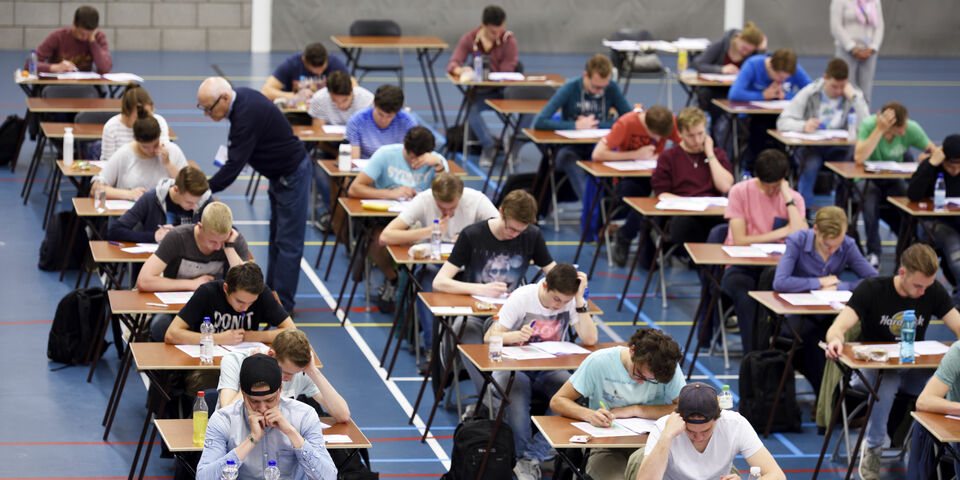The challenge to accommodate special needs
“We have more and more students who have special needs when they sit exams.” So said Boudewijn van Dongen, professor at Computer Science, in his recent column. He was speaking from personal experience, but enquiries made at Education and Student Affairs (ESA) reveal that they too are seeing an increase. The ever increasing number of students and the shortage of space aren't making the task of facilitating students in the best way possible any easier.
At ESA they have noticed a definite increase in the number of students who are applying to the student counselors for special provisions during an examination. Annemarie Urselmann, Manager of Student Facilities, explains, “This is due in part to the increase in student intake. Added to which, in recent years we've seen that more students want non-standard provisions during their exams - such as low-stimulus rooms or more than the standard amount of extra time. While we don't have any exact figures, it seems that student counselors are seeing an increase in the number of students with anxiety or panic disorders, AD(H)D and depression.”
Student counselor Patricia Veling confirms an increase in the number of applications for special exam provisions. And likewise in the problems involved in accommodating these needs. “Here at ESA and within the examination organization, we have been seeing these problems for some time now, particularly space and logistical issues. We are keen to help students, even at the last minute, though this means running into problems with, say, finding enough suitable rooms for students who are allowed to sit on their own. I know of cases in which the academic advisor did the invigilating because no invigilator was available.” Another example: “Increasingly, students are allowed to use speech software, but we don't have a campus-wide license for this facility.”
Recommendations for improvements regarding studying with a disability, and improvements generally, are proposed in the updated TU/e plan. The current policy plan dates from 2013 and was ready for an overhaul. One of the recommendations included in the new policy memorandum is that extra exam rooms should be reserved as a matter of course and well in advance. And that for some specific software, campus licenses should be applied for. This new policy proposal and the implementation plan will now pass through various rounds of discussion before being discussed by the University Council.
Veling says she is 'familiar with some' of the findings made by Boudewijn van Dongen, but to stop offering all forms of special treatment at TU/e, as Van Dongen suggests - albeit with some exaggeration - is, in her view, practically impossible. ”As a university we have a duty of care. Where the limits of this duty of care lie is something we have been discussing for some time now - you have to be able to justify what you do and don't provide. We are happy to do a great deal, but some requests are difficult to meet and you also have to take account of the work pressure on lecturers and invigilators.”
That TU/e allocates the extra provisions carefully is endorsed by Urselmann. “At high school, students were used to receiving plenty of guidance. As a rule, high schools are more relaxed about allocating provisions for exams. When the student comes to TU/e to study, the student counselors and examination committees take a fresh and critical look at whether all the provisions are still necessary. For most students, that comes as a bit of a shock. Often the exam provision is allocated temporarily and at the end of the quartile or academic year it is evaluated and in some cases adjusted.”
The numbers
To give an indication of the increase in applications: in 2015 roughly 250 students applied to the student counselors for exam provisions and over the past three years, this number has varied between 300 and 350 per year. These are students who request provisions for the first time and the majority of them are first-years. In any given year, however, the group with any given pre-existing provision is much larger than this. The table below shows an estimate of the numbers of examination provisions applied for in 2018-2019.
As the table clearly shows, the ‘standard’ provision of another ten minutes is the provision mostly commonly used by students. Urselmann says, “Students with dyslexia form the majority of the group needing this provision. Other students who benefit from a time extension are students with autism and those with ADHD. Roughly three-quarters of the students who apply to the student counselors have dyslexia, roughly 10 percent has AD(H)D or autism. For the rest, there are also students who have a temporary injury - such as a broken wrist, back problems or a concussion - who make use of examination provisions.”
How are the extra provisions allocated?
Students wishing to apply for a particular provision or who have questions about provisions should contact the student counselors. They study the evidence and try to estimate how the student's condition impacts their study, and the pace of study. The student counselor is able to allocate extra time; in principle this would be ten minutes per exam hour. For non-standard provisions, such as a low-stimulus room or software that reads aloud, the student counselors advise the examination committee for the student's program on the best course of action. The decision rests with the examination committee.
It should be said that TU/e offers students with a disability many provisions in addition to those for examinations. These include training courses run through ESA, financial support given through the Student Financial Support Fund for students who have fallen behind schedule, a revised study schedule, and the opportunity to postpone the binding study advice. You will find more information on this topic in the Study Guide.




Discussion